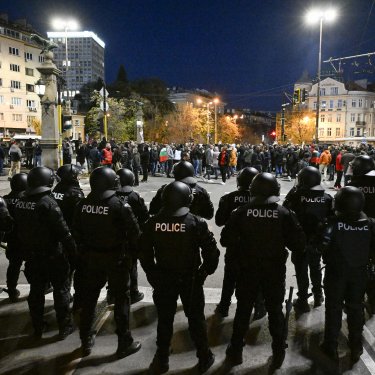Unprecedented police violence against journalists in Bulgaria : RSF will monitor that systemic measures are implemented

At least nine reporters were beaten, intimidated or obstructed by police during violent clashes on the sidelines of a football match in Sofia. Welcoming the Bulgarian Prime Minister Nikolay Denkov’s promises of measures to improve safety for journalists, Reporters Without Borders (RSF) calls for them to be implemented quickly.
Contacted by RSF on 22 November, the Bulgarian Prime Minister announced a series of measures in response to the attacks on journalists by police a week earlier, during the Euro 2024 qualifying football match between Bulgaria and Hungary. Denkov “strongly condemned” the police violence against journalists, the scale of which was unprecedented in recent years. “In order to ensure citizens' access to information, we must first guarantee the security and rights of the media that cover risky events”, the Prime Minister told RSF. Immediately after the incidents on 16 November, Denkov said he refused to be “the Prime Minister of a government that beats people in the street”.
At least six journalists have reported being deliberately beaten with truncheon or punched by the police on the night of the match: Dani Yordanov and Mario Gospodinov of the news website Gospodari.com, Kristian Ivanov and Emil Georgiev of the sports website Sportlive.bg, Yuliyan Sutev of Darik Radio, and Nikolai Parashkevov of the daily newspaper Telegraf, who sustained a serious head injury. The police also deliberately sprayed tear gas in the face of a photographer who wished to remain anonymous; demanded that Georgi Kozhuharov, a photojournalist for the daily Dnevnik, delete his images; and briefly detained Nikolai Ganchev, another Darik Radio reporter.
“We welcome the awareness – at the highest level of the Bulgarian government – of police violence against journalists. RSF will be vigilant in order to ensure that the promises are quickly followed by action. The use of arbitrary force must be punished in an exemplary manner. And to address systemic police abuse of power against reporters, Bulgaria needs systemic measures.
Denkov told RSF that he asked the Minister of the Interior to “conduct a thorough investigation” and “take appropriate measures with the police officers who [...] committed acts of violence against citizens, including journalists”. The Prime Minister also demanded the creation of a risk-reduction and prevention strategy for journalists, and training programs for the police officers.
Commission to investigate police violence
A few days after the police violence, the head of government announced the creation of a parliamentary commission of inquiry. However, the ensuing political controversy shows that its implementation is not ensured. The head of the Movement for Rights and Freedoms parliamentary group, Delyan Peevski, who enjoys a great influence within the ruling coalition, is opposed to the idea.
RSF supports the creation of such a parliamentary commission, in order to investigate the violence against journalists in particular. As well as the measures announced by the Prime Minister, RSF also calls for:
- a centralised and independent police inspection unit to investigate police violence against journalists;
- the creation of a rapid alert system for journalists who have been victims of attacks;
- a mechanism for dialogue between the police and journalists.
These recommendations, which RSF first made in 2021, are in line with the European Commission’s recommendations on the safety of journalists in the same year.
Bulgaria is ranked 71st out of 180 countries in RSF's 2023 World Press Freedom Index.
